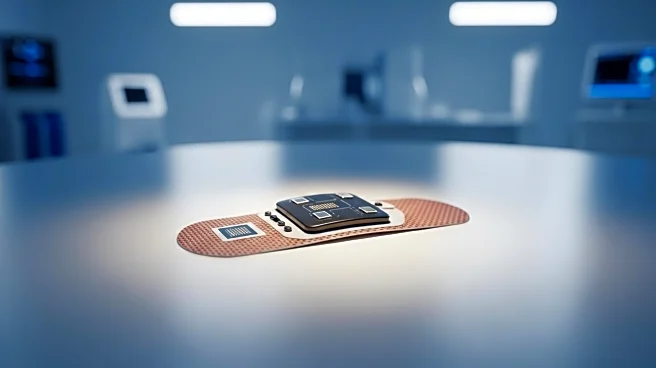What is the story about?
What's Happening?
Researchers at the University of California, Santa Cruz have developed a wearable device called 'a-Heal' that utilizes artificial intelligence, imaging, and bioelectronics to accelerate wound healing. The device, designed by a team led by Professor Marco Rolandi, integrates a camera and AI to monitor the healing stages of a wound and apply personalized treatments such as medication or electric fields. Preclinical tests have demonstrated that wounds treated with a-Heal heal approximately 25% faster than those receiving standard care. The device is portable and wireless, making it accessible for patients in remote areas or with limited mobility. It attaches to a commercially available bandage and transmits data to a secure web interface for physician oversight.
Why It's Important?
The development of the a-Heal device represents a significant advancement in wound care technology, potentially transforming treatment for chronic and acute wounds. By speeding up the healing process, the device could reduce healthcare costs and improve patient outcomes, particularly for those with limited access to medical facilities. The AI-driven approach allows for personalized treatment, which could be crucial in managing complex wound cases that do not respond well to conventional therapies. This innovation may also pave the way for further integration of AI in medical devices, enhancing the precision and effectiveness of healthcare solutions.
What's Next?
The research team is exploring the potential of the a-Heal device to improve healing in chronic and infected wounds. Further clinical trials and studies are likely to assess its efficacy in diverse patient populations and settings. The successful implementation of this technology could lead to broader adoption in hospitals and clinics, potentially influencing future developments in AI-powered medical devices. Stakeholders such as healthcare providers and medical device manufacturers may closely monitor these advancements to evaluate integration into existing treatment protocols.
Beyond the Headlines
The ethical implications of AI in healthcare, particularly in personalized treatment, are significant. Ensuring patient data privacy and the accuracy of AI-driven diagnostics will be crucial as such technologies become more prevalent. Additionally, the device's ability to provide remote care could address disparities in healthcare access, offering solutions to underserved communities. Long-term, this innovation might contribute to a shift towards more decentralized and patient-centered healthcare models.














